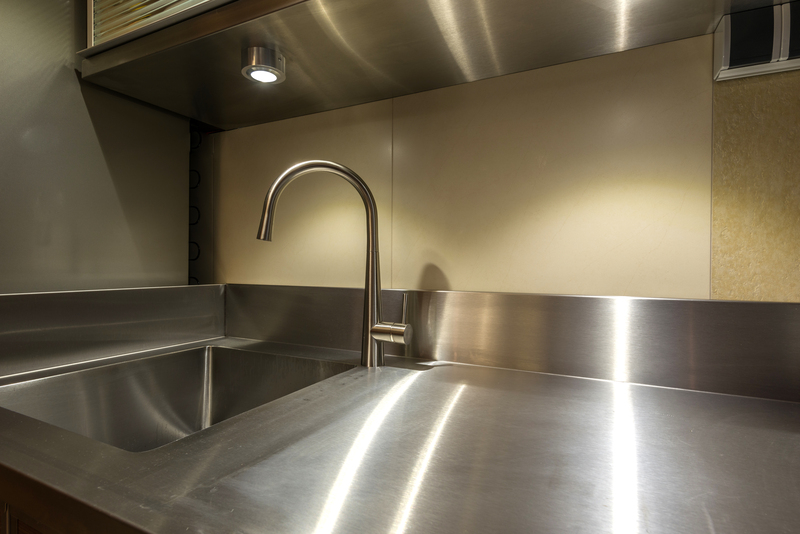Cleaning Habits for Better Mental Health
Posted on 11/04/2025
In today's fast-paced world, maintaining mental well-being has become a significant challenge. Research indicates that a cluttered and disorganized environment can negatively impact one's mental health. However, cultivating effective cleaning habits can help foster a sense of calm and enhance overall mental wellness. In this article, we will explore various cleaning habits and how they contribute to better mental health.
The Connection Between Clutter and Mental Health
Clutter and disorganization can lead to feelings of anxiety, stress, and even depression. When our living or working space is chaotic, it can create a sense of chaos in our minds as well. On the other hand, a clean and organized environment promotes feelings of control, reduces stress, and increases overall well-being.
Clutter can also affect our ability to focus. Studies have shown that a tidy space can improve concentration and productivity. A clean environment reduces the number of distractions, allowing us to focus better on tasks at hand.

The Benefits of Cleaning for Mental Health
Cleaning can have a therapeutic effect on our mental health, providing numerous benefits:
- Reduction in Stress and Anxiety: Cleaning can help reduce stress and anxiety by creating a sense of order and control. It provides a break from stressful thoughts and allows us to focus on physical tasks, helping to clear the mind.
- Enhanced Mood: A clean and organized space can boost our mood and improve overall emotional well-being. It provides a sense of accomplishment and satisfaction.
- Increased Energy Levels: A clutter-free environment can improve energy levels. A clean space is often more inviting and motivating, encouraging us to be more active and productive.
- Improved Sleep: A tidy bedroom can enhance the quality of sleep. A clutter-free space promotes relaxation and makes it easier to unwind before bedtime.
Establishing Effective Cleaning Habits
Developing effective cleaning habits can help maintain a clean and organized environment, leading to better mental health. Here are some steps to establish such habits:
Create a Cleaning Schedule
A cleaning schedule helps ensure that cleaning tasks are consistently performed. It can prevent overwhelming buildup of clutter and mess. Here are some tips for creating a cleaning schedule:
- Divide cleaning tasks into daily, weekly, and monthly chores.
- Assign specific tasks for each day of the week.
- Set aside dedicated time for cleaning tasks and stick to the schedule.
Start Small and Gradual
Begin with small and manageable tasks to avoid feeling overwhelmed. Gradually increase the scope of cleaning activities as you build momentum. This approach helps maintain motivation and prevents burnout.
Declutter Regularly
Regular decluttering is essential to prevent the accumulation of unnecessary items. Here are some tips to declutter effectively:
- Start with one area or room at a time.
- Sort items into categories: keep, donate, or discard.
- Be mindful of sentimental attachments and make thoughtful decisions.
Establish Daily Tidying Habits
Incorporating daily tidying habits can help maintain a clean environment consistently. Simple practices like making the bed, putting away items after use, and doing a quick cleanup before bedtime can make a significant difference.
Seek Help and Support
Don't hesitate to seek help from family members, roommates, or professional cleaning services if the task feels overwhelming. Sharing the responsibility can make cleaning more manageable and less stressful.
The Role of Mindfulness in Cleaning
Practicing mindfulness during cleaning can enhance the mental health benefits. Mindfulness involves being fully present and engaged in the moment, and it can transform cleaning into a meditative and calming activity. Here's how to incorporate mindfulness into cleaning:
Focus on the Task
Pay attention to the details of the cleaning task at hand. Notice the textures, sounds, and movements involved. Being present and attentive can help clear the mind and reduce stress.
Breathe and Relax
Take deep breaths and maintain a relaxed posture while cleaning. This can promote a sense of calm and prevent tension build-up.
Practice Gratitude
As you clean, appreciate the space you are tidying. Be grateful for the comfort and security it provides. This positive mindset can enhance the emotional benefits of cleaning.

Incorporating Cleaning Rituals for Better Mental Health
Certain cleaning rituals can further enhance mental well-being. These rituals can be personalized to suit individual preferences and needs. Here are some examples:
Essential Oil Diffusers
Using essential oil diffusers while cleaning can create a soothing atmosphere. Scents like lavender, eucalyptus, and chamomile have calming properties and can enhance the overall cleaning experience.
Music and Podcasts
Listening to calming music or engaging podcasts can make cleaning more enjoyable and mentally stimulating. It can transform cleaning into a pleasurable and fulfilling activity.
Incorporate Breaks
Take short breaks during cleaning sessions to relax and recharge. Use this time to practice deep breathing, stretch, or simply enjoy a cup of tea.
Celebrate Accomplishments
Acknowledge and celebrate the completion of cleaning tasks. This sense of accomplishment can boost self-esteem and motivation, reinforcing positive cleaning habits.
Conclusion
Cleaning habits play a crucial role in promoting better mental health. A clean and organized environment can reduce stress, enhance mood, increase productivity, and improve sleep quality. By establishing effective cleaning routines, practicing mindfulness, and incorporating personalized cleaning rituals, we can create a harmonious living space that nurtures our mental well-being. Embrace the power of cleaning and experience the positive impact it can have on your mental health.
Latest Posts
Uncovering the Benefits of Hot Water Extraction
Save Time on Bathroom Cleaning Chores
Quick House Clean in 30 Minutes








